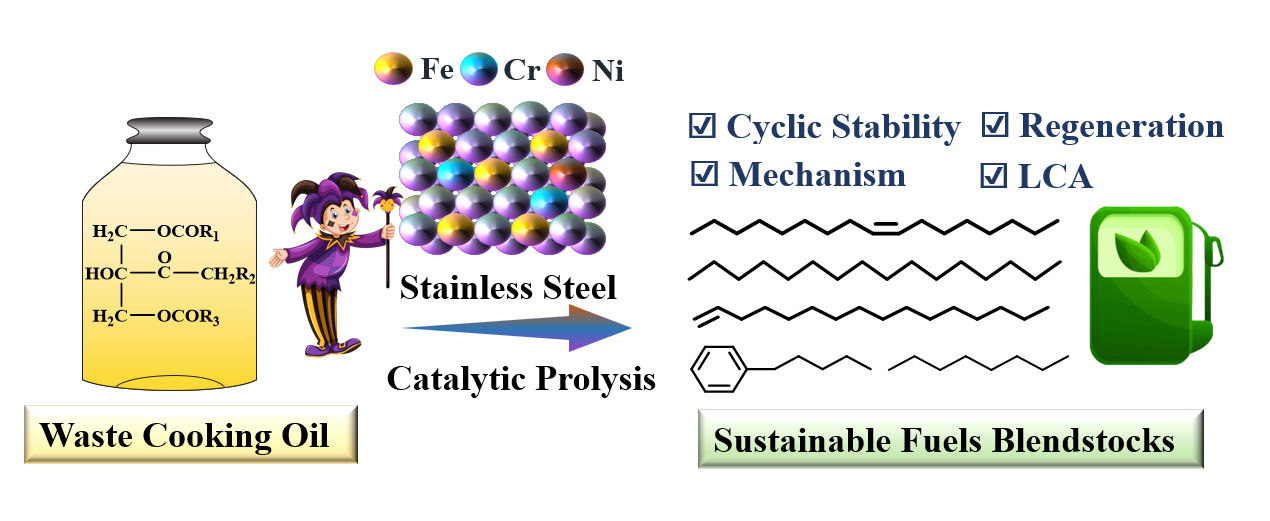废弃油脂热解产燃料Stainless steel catalyzed pyrolysis of waste oil: Biofuel production, catalyst regeneration and environmental assessment
星期三, 1 10 月, 2025Stainless steel catalyzed pyrolysis of waste oil: Biofuel production, catalyst regeneration and environmental assessment
Recently, Master graduate student Mr. Guo-qiang Zhu (currently a PhD student at City University of Hong Kong) supervised by Associate Prof. Lu-jiang Xu and Prof. Zhen Fang published a research article in Chemical Engineering Journal about stainless steel catalyzed pyrolysis of waste cooking oil.
Valorizing waste cooking oil into biofuels not only achieves renewable green fuels but mitigates waste disposal. Here, we demonstrate a catalytic pyrolysis process using novel regenerable austenitic stainless steel catalysts containing Fe (II) and Fe (III) active phases. Firstly, an activated SS catalyst with austenite Fe and metal oxides showed outstanding deoxygenation performance, directionally promoting the enrichment of alkene. And then, optimal pyrolysis conditions were investigated via response surface methodology and determined as temperature 550 °C, single catalyst layer and feeding rate 3 mL/h. Besides, catalyst exhibited exceptional cyclic stability over 10 consecutive cycles, attributed to its unique coke-mediated regeneration mechanism. Distinguished with active surface sites, the regenerated catalyst recovered the catalytic activity and made coke deposits form carbon nanotube structure where the regeneration mechanism was proposed in terms of experimental results and characteristics of coke and catalyst. Eventually, life cycle assessment was conducted stressing on the reduction of global warming potential and environment impact for whole process and sensitivity of key parameters. Overall, this work provides fundamental insights into coke-catalyst interactions while establishing an industrially viable pathway for sustainable biofuel production.
Related results were accepted in Chemical Engineering Journal:

Stainless steel catalyzed pyrolysis of waste oil to Biofuels
不锈钢催化废弃油脂热解:生物燃料生产、催化剂再生和环境评估
最近,硕士毕业生祝国强,现为香港城市大学在读博士研究生,在徐禄江副教授和方真教授的指导下,在国际学术期刊Chemical Engineering Journal (Q1, IF=13.2) 发表了一篇关于不锈钢催化废弃油脂热解的研究性论文。
将废弃食用油转化为生物燃料,不仅可以获得可再生的绿色燃料,还可以减少废物处理。本文展示了一种采用新型可再生奥氏体不锈钢催化剂的催化热解工艺,该催化剂含有 Fe(II) 和 Fe(III) 活性相。首先,含有奥氏体和金属氧化物的不锈钢催化剂表现出优异的脱氧性能,定向促进了烯烃的富集。然后,通过响应面法优化了最佳热解条件,确定了最优条件为温度 550 ℃、单层催化剂和进料速率 3 mL/h。此外,由于其独特的积炭介导再生机制,催化剂在连续 10 次循环中表现出优异的循环稳定性。由于活性表面位点的存在,再生催化剂恢复了催化活性,并使积炭沉积形成碳纳米管结构,并根据实验结果以及积炭和催化剂的表征结果提出了再生机理。最后,对整个工艺进行了生命周期评估,重点关注降低全流程的全球变暖潜能值和环境影响,以及关键参数的敏感性。这项研究为焦炭-催化剂相互作用提供了基础性见解,同时也为可持续生物燃料生产提供了重要途径。
结果发表在Chemical Engineering Journal:
G Zhu, H. Xu, J. Zhang, G. Xie, Z. Fang, L. Xu*. Stainless steel catalyzed pyrolysis of waste oil: Biofuel production, catalyst regeneration and environmental assessment. Chemical Engineering Journal(IF=13.2)(2025) 167020. https://doi.org/10.1016/j.cej.2025.167020